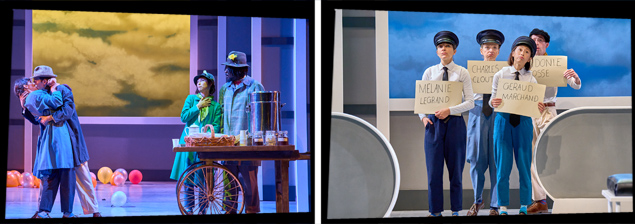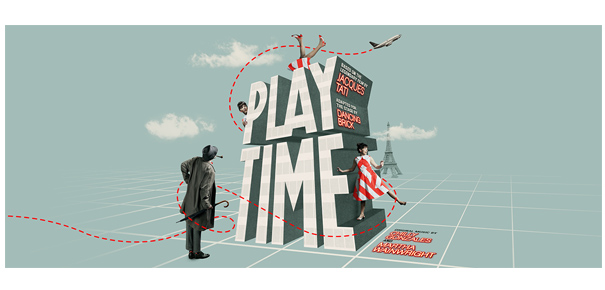 |
4.0 out of 5.0 stars
“An aesthetically pleasing spectacle, in which the magic of the everyday takes centre stage” |
|
As the auditorium quietens and the lights begin to dim, we await the customary drawing of the curtains and that killer first line to hook us in. None of which occur. Instead, an almost cartoon-like character dressed with a bow tie enters the stage holding balloons, with the backdrop of a simple netted transparent screen behind him. He doesn’t say a word, but he smiles warmly while bashfully blowing balloons and throwing them into the audience. Is he the warm up act, a children’s entertainer or a mime perhaps? No, this is Monsieur Hulot, our leading man. He is inviting us to play. This is the play adaptation of the classic 1967 movie by French film director Jacques Tati. The movie is absolutely atypical, a virtually dialogue-less film, which blends the main characters into the background, as the spotlight is shone on the supporting artists. The stage adaptation respects Tati’s intentions, while satisfyingly merging comically choreographed relatable scenarios over a visually pristine mise-en-scène. This is the essence of musical theatre, but without the showtunes or soliloquies.
As the netted screen rises, we become the fly on the wall of a busy French airport in the 1960s, as we observe a conveyor belt of endearingly familiar characters rush through the terminal, all depicting their own humorously relatable micro scenes in a fast paced modern world over upbeat retro lounge music. We meet passengers missing their flights, a frustrated cleaner, a woman falling backwards down the escalator and the charming American elderly couple (who are a constant throughout the piece). At first, you would be forgiven for believing that this is mere scene setting, until you realise that this is the scene. And within this we are subtly introduced to our heroes of the piece, American tourist Barbara and Monsieur Hulot, who go on to fall in love.
The scenes that follow provide the most entertainment. Unlike other romantic comedies, the next few scenes do not fixate on developing the romance between the two characters, but rather allows this to become the by-product of the circumstances around them. It’s the chorus who tell a story of nothingness and everything at the same time, where any dialogue only serves to create atmosphere, rather than embellish the plot. The thread of 1960s modernism is playfully critiqued throughout, such as the scene in which the latest (and often absurd) products are hilariously demonstrated by different personalities in a department store, popping in and out from both sides of the stage. It’s as if to suggest that there is an innate human desire for instant gratification and perfectionism. Yet, the antithesis of this is beautifully enacted in the restaurant scene, where everything that could go wrong, does! Whatever modcons are available, we cannot help but be flawed humans.
Nevertheless, at the heart of this humanity, there is love. Like any love story, we expect a happy ending. Monsieur Hulot and Barbara represent a juvenile kind of love, one that we all aspire to have, before life’s tribulations take over. Candy Floss coloured lights shine upon them, as we observe shared coy glances and playfulness. Buskers begin to perform a heartwarming French chanson, as they dance into each other’s arms. Sometimes words don’t need to do all the talking.
Playtime leaves the audience with a certain feeling that so few pieces of cinema and theatre offer these days. There is no hidden political agenda or societal critique, no harrowing moral of the story or invitation for introspection. The message (if any) is as relevant today as it was in 1967. Perhaps we should spend more time looking outwards than inwards and observe what’s around us instead of what’s within us. We spend so much time trapped in the burden of our own self-created universes, but forget that everyone else does too. If only we stopped to notice the world around us in all of its imperfect glory, not only would we be more present in our own lives, we would joyfully find a way to connect with each other more, like children at playtime.
|
|
BOOK NOW – Review written by Corinna Jane | 12 September 2022





